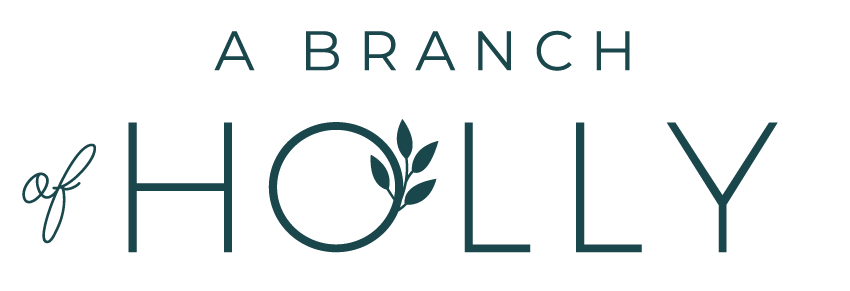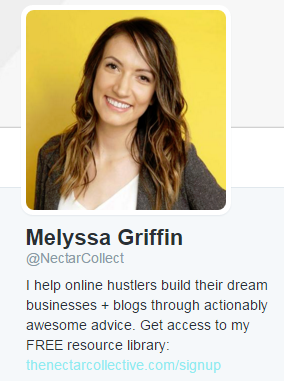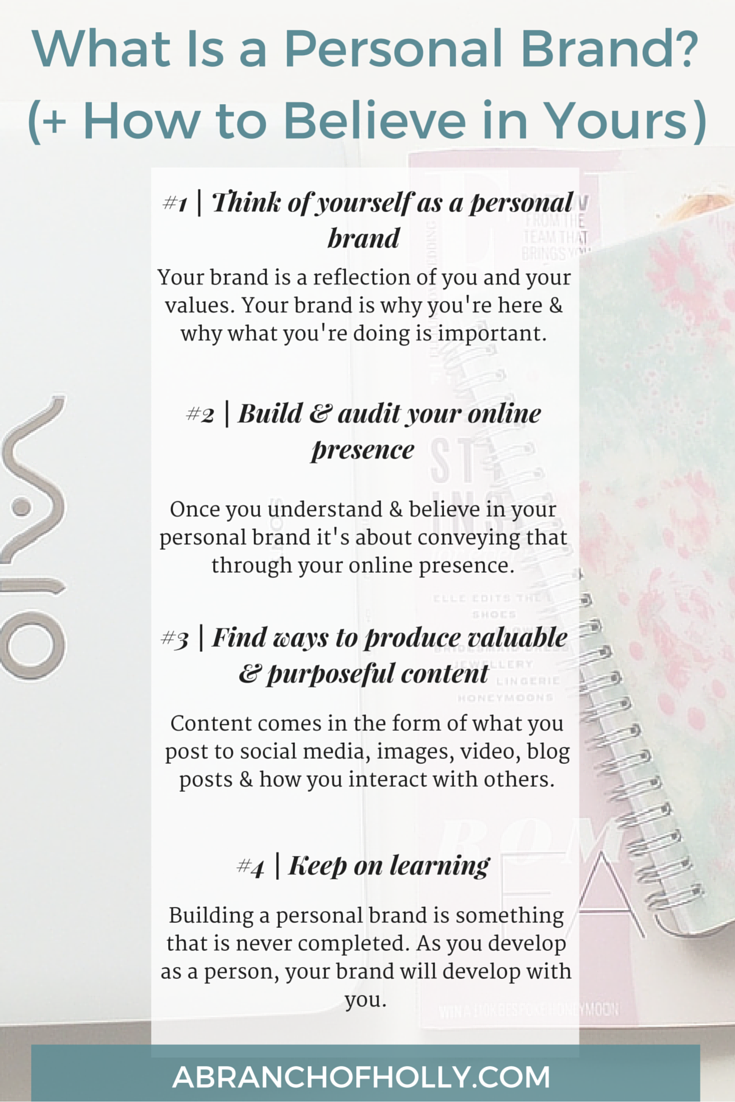What is a Personal Brand? (+ How To Believe In Yours)
What do you think of when you see the word “branding”? A logo? Design? Colours? Style? They’re all parts of branding. But what about you as a person? Do you have a logo? A specific design? A specific style?
Somewhere along the way branding has become associated with how something looks. But I've always been taught never to judge a book by its cover.
You wouldn't want someone to get the wrong impression of you, right?
The impression that you give and the values that you hold in your everyday lives are there to represent you.
That is your personal brand.
Here’s the definition that comes up when you put “what is a personal brand” into Google:
“Personal branding is the practice of people marketing themselves and their careers as brands. While previous self-help management techniques were about self-improvement, the personal-branding concept suggests instead that success comes from self-packaging.”
Now you might be thinking to yourself: I don’t have a brand, I haven’t been actively creating one. But you’ll find that it has actually developed naturally and exist now, for you, whether you know what branding really is or not.
You don’t create a personal brand. The truth is, you’ve had one for ages. You just haven’t recognised it yet.
You’re a bit sceptical, aren't you?
I know. I was at one point.
But try this.
Google yourself. Just like you did in the blog post yesterday on social media branding. Google your name, your blog name and your location.
Every result that comes up in relation to you is part of your personal brand.
Your social media platforms, your LinkedIn profile, your mentions on other blogs and websites – these are all part of your personal brand. They all help to develop your personal brand.
So the question we need to answer now isn't “do I have a personal brand?” But instead, “how do I use my personal brand to my advantage? How do I define it to be what I want?”
Because that way you’ll be ahead. Employers are so impressed when you can talk about yourself as a personal brand. And if you can communicate that in a unique and effective way, that’s how you’ll be remembered.
That’s how you’ll grow.
Now we’re going to dig in. Let’s do this. Want to know how to believe that you are a personal brand? Read on.
#1 | Think of yourself as a personal brand
This is where it starts. This is where the magic happens and game-changing moments can appear. Believing that you are a personal brand comes with thinking that you are one.
Get it?
You need to think of yourself as a personal brand and see yourself as one before you can really believe in it. And a lot of this comes from understand who you really are.
The most successful and believable personal brands are ones that are honest and real. It’d be pretty difficult to try and build a brand around someone fake, right? Everything you do would have to be forced for the rest of your life. You’d have to act this way forever, just to keep up the perception that you’re giving people.
I read somewhere that you should build a personal branding by moulding yourself into what others see.
You should not do this.
Your brand is you. Your brand is a reflection of you and your values. Your brand is why you’re here and why what you’re doing is important.
What do you believe in? What are your values? How do you act in your everyday life? What are your strengths and weaknesses?
These are the question you need to answer. This is how people are going to be able to connect with you and your brand.
Think about it this way – someone visits your website for the first time. What impression do you want them to have? How do you want them to think? What do you want them to gain from your brand?
Branding isn't developed through design. It’s developed through trust. And something really important is getting people to trust you.
To believe in your brand, you need to think of your brand as you. Then it’s up to you to share that with the world.
Don’t be afraid to be vulnerable. Don’t be afraid to share your mistakes. People will really admire that.
#2 | Build and audit your online presence
Once you understand and believe in your personal brand, it’s about communicating that to your audience. Everything you feel about your brand you need to convey through the elements of your online presence.
Here are some of the things you’ll need to think about:
- Blog content
- About page
- Home page
- Periscope
- Photography
And anything else that forms a part of your online presence.
If you represent positivity and optimism throughout your everyday life, you don’t want to come across in a negative way. If a big part of your brand is being a single-mum, you want to make sure that these people are in your audience, and you’re opening up yourself to them.
The first time you edit all your platforms is the hardest. Coming up with one or two sentences that really defines your brand is no easy task. But once you’ve done it, it’s done. That way, you only need to make minor changes.
The bio you use is probably one of the most important things when it comes to portraying your online presence. The best thing you can do is nail your bio.
Take these as examples. These people have got their brands nailed and you instantly know what their values are and who they want to help through their bios.
Each of these ladies do something completely different. But just from reading their bio, you get a real taste of what they’re about and what you do.
If you want even more help, I’d definitely advise doing this exercise from Regina. It helps you write your brand statement in less than ten minutes. And then you’ve got it for life.
Everything relates to your brand. Everything. You might not see it yet, but as you’re reading these words, I bet you’re starting to become more aware in the back of your mind. Take a look at where you are online and ask yourself, “do all these work together? Do they all help to represent my brand in the right way?”
#3 | Find ways to produce valuable and purposeful content
Content is how we communicate with others online. But don’t think this is just restricted to blog posts and articles. Content comes in the form of what you post to all your social media platforms, including images, video, comments and how you interact with others. Replying to a tweet? That acts as content. Post a video on Instagram? That acts as content.
Your job is to make sure that everything you do online is as intentional as possible.
I love scrolling through Twitter and Instagram. I could spend all night in bed doing it – and I know I’m not the only one! But I still don’t scroll through my feeds mindlessly. I don’t go on social media all the time. When I do, yes, I’m going on for a scroll. But I still be intentional on there. I read everything I want to read, I admire things, I make notes for ideas, I interact. It’s purposeful. And acting intentionally helps to build your brand.
Just as all your online platforms work together, your content has to as well. They’ve all got to contribute to the meaning of your brand. And once you understand your brand and believe in it, you can start to be more strategic about how you convey this through your content.
For instance, one of the core values of ABOH is positivity. I try to be as positive as I can in everything I do, and I try to reflect this through my content. Everything I write is written in a positive tone and promotes positivity to others. If I was to write a post with a negative outlook this wouldn't be in line with my personal brand.
It’s not difficult. Honestly. If you believe in these things and they’re a part of who you are, they’ll automatically be a part of your brand too.
#4 | Keep on learning
Something I'm going to say in my lecture on Thursday to the Journalism students is that you do not have to be an expert in your industry. You don’t need to feel like you have to know everything. Things are always changing and evolving. Part of your job is to stay as up to date as you can.
Building a personal brand is something that is never done. There’s no finish line to cross when you know you’ve completed it. This is an ongoing thing that takes time. And as you develop as a person, your brand will develop with you.
Soon enough, you might start to find opportunities coming your way. I know I have. People will start to recognise your brand and know what you stand for. They’ll start to come to you because they’re developing trust with your brand.
Be open, be honest and be active. This will make you more human. And you as a human are your brand.
Do you believe in your personal brand? I'd love to know more about it. Share your short bio in the comments and let us know what your brand is about!





